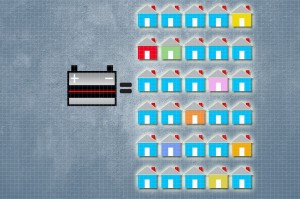
According to engineers at MIT, we can recycle them to make long-lasting, low-cost solar panels. Credit: Christine Daniloff
The old lead-acid battery in your car may not be as useless or environmentally dangerous as was once thought. In fact, these batteries may be the answer to creating a cheap source of green energy.
According to engineers at MIT, old lead-acid batteries can be recycled and easily converted into long-lasting, low-cost solar panels. So far, the solar cells in the panels have yielded promising results – achieving over 19 percent efficiency in converting sunlight to useable electricity.
This new process has the potential to be very environmentally beneficial. This from The Washington Post:
The new study, published in Energy and Environmental Science, shows that these solar cells can be built efficiently using recycled lead. Instead of adding more lead to the environment, this process would actually prevent lead in defunct car batteries from entering landfills. Once the lead entered this new production process, the material could be recycled from one solar cell to another in much the same way that car batteries continue to use it from generation to generation.
The process (shown in the video below) has the potential to make enough solar energy from one single care battery to power 30 households.
https://www.youtube.com/watch?v=X3omqERE1AA
Read more about the progressing science of solar cells and energy conversion in ECS’s Digital Library.


